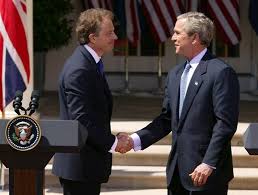John Major appeared to claim today that Tony Blair can ‘unblock’ the release of the ‘notes’ that the Chilcot Inquiry wish to publish-see this great background note published today from the House of Commons Library. Major said:
I suppose the previous Labour government could approach them and say, ‘We’d like to overrule this, we think it better if they release those papers’, but the government can’t do that. Let me make that point: the government cannot do that. Mr Blair could, the previous Labour government could, and maybe in their own interests they could think about that because otherwise, as I say, this will fester and I don’t think anybody wishes to see that.
Major’s points raise the issue of who is blocking Chilcot and what can be done. It all seems a bit rich from Major, who himself has complained of being smeared as an ‘FOI blocker’ and had his own bruising experience of being ‘consulted’ on a controversial release.
Who is Blocking Chilcot?
As the Library Note points out, when the Chilcot Inquiry was set up, Gordon Brown said it would
…have access to the fullest range of information, including secret information. In other words, its investigation can range across all papers, all documents and all material. It can ask for any British document to be brought before it, and for any British citizen to appear. No British document and no British witness will be beyond the scope of the inquiry. I have asked the members of the committee to ensure that the final report will be able to disclose all but the most sensitive information—that is, all information except that which is essential to our national security.
There seemed to be some rather blurred lines here, as the Inquiry in 2012 spoke of the need to
…negotiate the declassification of a significant volume of currently classified material with the Government, to enable this to be quoted in, or published alongside, the Inquiry’s report. That process has begun, but there will be a series of further major requests as drafting progresses. The Inquiry has made clear that it will need co-operation from the Government in completing this in a satisfactory and timely manner.
The recent concern is over the 130 ‘notes’ between Bush and Blair. The problem is, of course, that these documents are also US documents-not wholly British. Claims that the government haven’t been particularly cooperative on this have dogged the Inquiry focusing, as Standard Note records, on Cabinet Secretary Jeremy Heywood:
The government has denied that it is unduly blocking the release of documents, although there are persistent stories in the press about rows between the Cabinet Office and the Inquiry over the declassification of documents, including private messages from Tony Blair. Civil servants are said to be worried that the revelation of private conversations between the then Prime Minister and US President would do lasting damage to the relations between the UK and the US.
As well as civil servants here, I don’t know if the US government wants them released-the signs are they don’t, given the compromise that the published extracts ‘gist’ will somehow not ‘reflect the views’ of George W Bush.
I’m also not entirely sure if, practically or legally, Blair actually get the documents published, especially if there is resistance from the current UK or US governments. One of the reasons I think he can’t is based on a principle developed through FOI-following a scandal around an ex-Prime Minister named John Major….
John Major’s Black Wednesday Redux
John Major’s comments indicate a spot of amnesia on the matter of documents. John Major himself has been here before-something he publically complained about to Leveson (scroll to page 4). In the run up to the 2005 General Election an FOI request was made by a Labour MP for documents relating to Britain leaving the ERM in 1992, so-called Black Wednesday-see the story here. (The House of Commons Library has another very useful note detailing the conventions on FOI and past governments here).
After the controversial release in the run up to the General Election, and allegations that Major tried to block it, the Treasury website stated:
As part of applying the public interest test under the Act before releasing the information, the Treasury has consulted a number of individuals involved at the time, as well as the Bank of England. Those consulted are able to comment on the papers and suggest that text should be included or excluded within the terms of the law. While their views are taken into account, the ultimate decision on what to publish remains with the Department holding the papers, in this case the Treasury
It also actually pointed out that Major didn’t ‘block’ it:
It is not normally the Treasury’s intention to comment publicly on the process for consulting externally in advance of freedom of information releases. However, given the press reporting in this case, we can confirm that neither Mr Major nor Lord Lamont have suggested any edits or deletions to any of the papers’.
It then repeated the fact that, under FOI at least, for the Treasury and Cabinet Office, no former Minister can issue a ‘veto’:
The Cabinet Office operates a policy of consulting former Ministers before release of papers relating to a previous administration, and this has been agreed with the Opposition…in the footnote above, the Attorney General will decide on exemptions relating to former administrations. Former Ministers do not have a veto over disclosure.
I am, as anyone who reads my post knows, no defender of Tony Blair, either generally or in his rather unique views of FOI. FOI experience at least tells us Blair was consulted but couldn’t ‘veto’-it could be different for Chilcot, but I doubt it. The irony of Major bringing up FOI is also a little too much, particularly as he rejected an Act when Prime Minister as ‘unnecessary’ and gave us his wonderful Code of Access instead.


